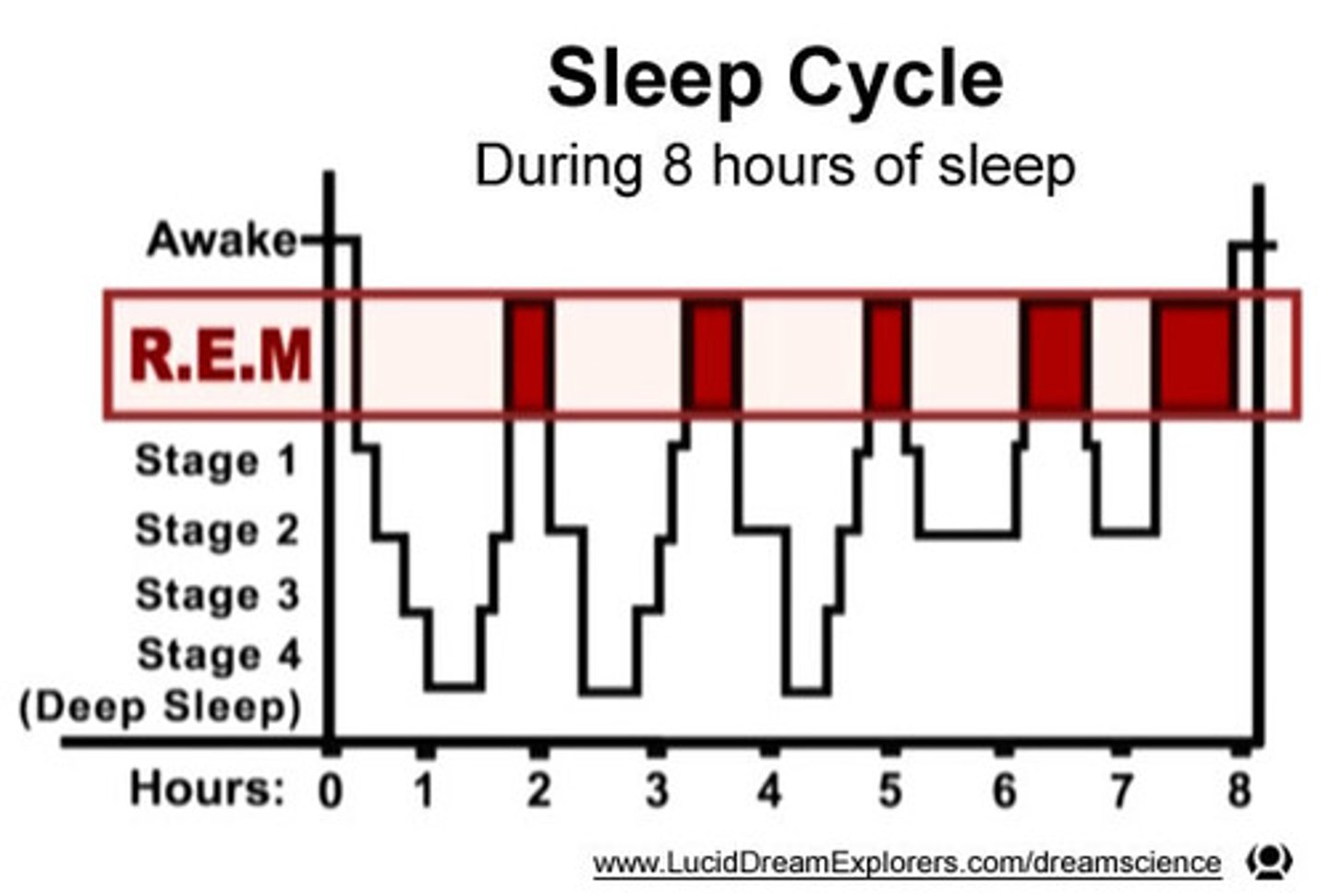AP Psychology - Sleep
1/27
There's no tags or description
Looks like no tags are added yet.
Name | Mastery | Learn | Test | Matching | Spaced | Call with Kai |
|---|
No analytics yet
Send a link to your students to track their progress
28 Terms
Consciousness
Our awareness of ourselves and our environment.
Circadian Rhythm
A regular sequence of biological processes, such as temperature and sleep, that occurs (approximately) every 24 hours.
Sleep Cycle
A period of sleep lasting about 90 minutes and including one or more stages of NREM sleep, followed by REM sleep.

REM Sleep
A recurring sleep stage during which vivid dreams commonly occur. Also known as paradoxical sleep, because the muscles are relaxed (except for minor twitches) but other body systems are active.
Alpha Waves
The relatively slow brain waves of a relaxed, awake state.
Theta waves
stage 1. Person drifting from wakefulness into sleep; muscles are still active and may twitch; hallucinations may occur
Delta Waves
The large, slow brain waves associated with deep sleep. (stage 3/4)
Insomnia
Recurring problems in falling or staying asleep.
Narcolepsy
A sleep disorder characterized by uncontrollable sleep attacks. The sufferer may lapse directly into REM sleep, often at inopportune times.
Sleep Apnea
A sleep disorder characterized by temporary cessations of breathing during sleep and repeated momentary awakenings.
Night Terrors
A sleep disorder characterized by high arousal and an appearance of being terrified; unlike nightmares,these occur during Stage 4 sleep, within two or three hours of falling asleep, and are seldom remembered.
Occurs usually in small children
Manifest Content
According to Freud, the remembered story line of a dream.
Latent Content
According to Freud, the underlying meaning of a dream.
REM Rebound
The tendency for the amount of REM sleep to increase following REM sleep deprivation.
Stage 1
the first stage of sleep when you are very aware of your environment but are scientifically asleep.
Stage 2
the stage of sleep characterized by sleep spindles and K complexes, spikes of brain activity
Stage 3 & 4
Delta Sleep, no awareness of environment, growth hormones are released, illnesses are addressed, all the chemicals you lost during the day are replenished.
NREM sleep
non-rapid eye movement sleep; encompasses all sleep stages except for REM sleep
REM Sleep
rapid eye movement sleep, a recurring sleep stage during which vivid dreams commonly occur. Also known as paradoxical sleep, because the muscles are relaxed (except for minor twitches) but other body systems are active.
Freud's Wish Fulfillment
The theory that dreams provide a "psychic safety valve"—for otherwise unacceptable feelings; dreams have a manifest (remembered) content and a deeper layer of latent content—a hidden meaning that needs interpretation.
Information Processing
The theory that dreams help us sort out the day's events and consolidate our memories
Activation Synthesis
The theory that dreams are the result of the cerebral cortex interpreting and organizing random flashes of brain activity, originating in the lower brain structures, especially the pons while the prefrontal cortext is inactive.
activation-information-mode model (AIM)
A revised version of the activation-synthesis theory of dreams in which information that is accessed during waking hours can have an influence on the synthesis of dreams.
neurocognitive dream theory
A theory that dreams are the accidental result of sleeping with no adaptive or evolutionary purpose or value.
subconsciousness
is a store of information that was registered in memory without being consciously attended.
precociousness
Ideas that are not in your awareness presently, but you could recall them if you had too.
nonconciousness
things like heartbeat, blood pressure, breathing, blinking, etc
unconsciousness
According to Freud, repressed thoughts, kept from emerging into consciousness.